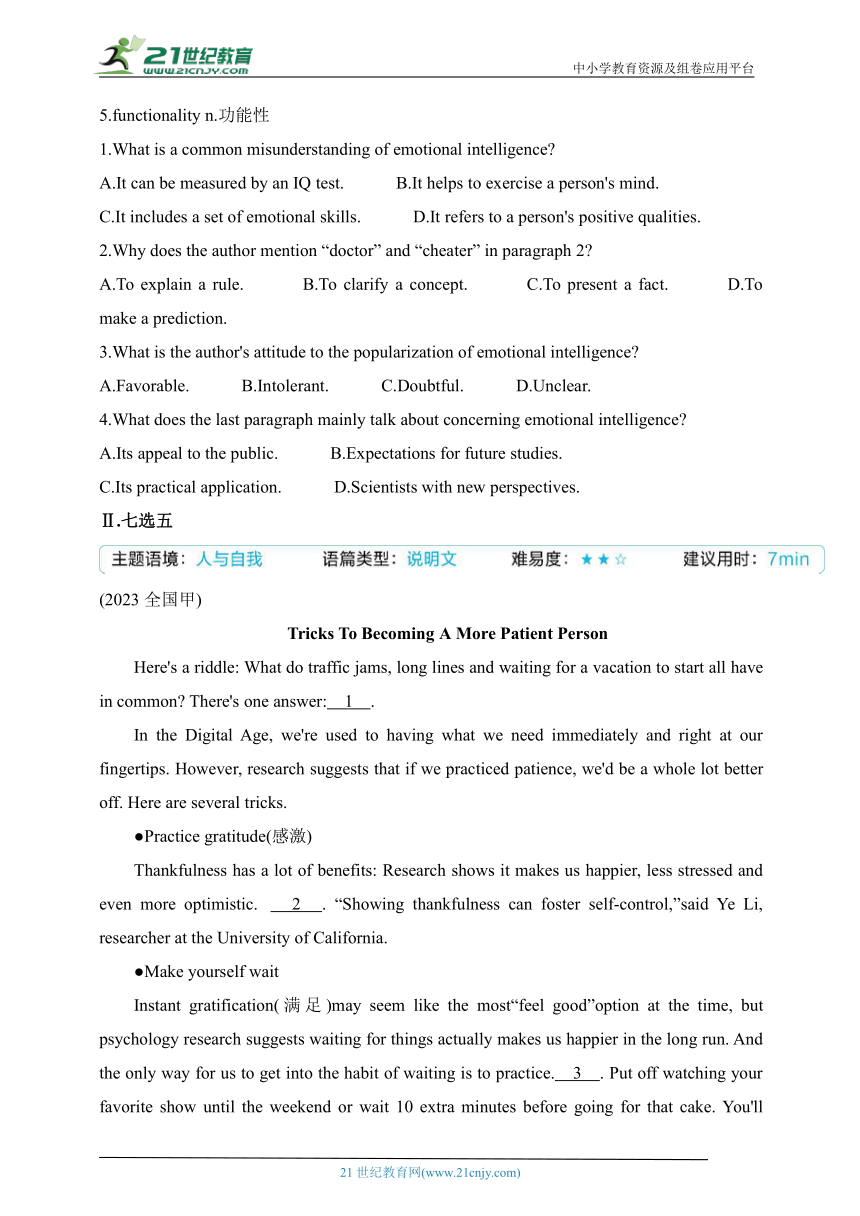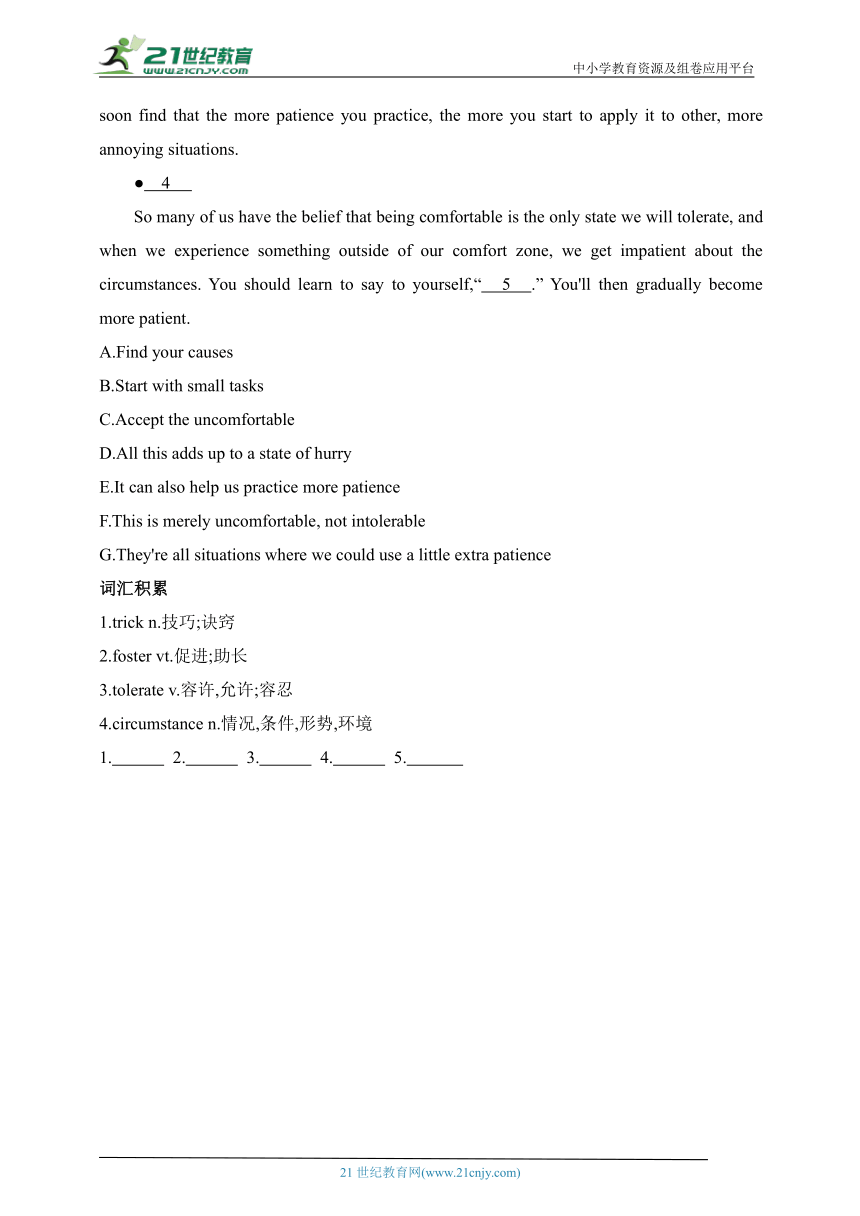2024外研版高中英语必修第三册同步练习--Unit 1 五年高考练(含答案与解析)
文档属性
| 名称 | 2024外研版高中英语必修第三册同步练习--Unit 1 五年高考练(含答案与解析) |

|
|
| 格式 | docx | ||
| 文件大小 | 1010.6KB | ||
| 资源类型 | 试卷 | ||
| 版本资源 | 外研版(2019) | ||
| 科目 | 英语 | ||
| 更新时间 | 2023-11-13 10:14:40 | ||
图片预览



文档简介
中小学教育资源及组卷应用平台
2024外研版高中英语必修第三册同步
五年高考练
Ⅰ.阅读理解
(2021全国新高考Ⅰ,D)
Popularization has in some cases changed the original meaning of emotional(情感的)intelligence. Many people now misunderstand emotional intelligence as almost everything desirable in a person's makeup that cannot be measured by an IQ test, such as character, motivation, confidence, mental stability, optimism and “people skills”. Research has shown that emotional skills may contribute to some of these qualities, but most of them move far beyond skill-based emotional intelligence.
We prefer to describe emotional intelligence as a specific set of skills that can be used for either good or bad purposes. The ability to accurately understand how others are feeling may be used by a doctor to find how best to help her patients, while a cheater might use it to control potential victims.Being emotionally intelligent does not necessarily make one a moral person.
Although popular beliefs regarding emotional intelligence run far ahead of what research can reasonably support, the overall effects of the publicity have been more beneficial than harmful. The most positive aspect of this popularization is a new and much needed emphasis (重视) on emotion by employers,educators and others interested in promoting social well-being. The popularization of emotional intelligence has helped both the public and researchers re-evaluate the functionality of emotions and how they serve people adaptively in everyday life.
Although the continuing popular appeal of emotional intelligence is desirable, we hope that such attention will excite a greater interest in the scientific and scholarly study of emotion. It is our hope that in coming decades, advances in science will offer new perspectives(视角)from which to study how people manage their lives. Emotional intelligence, with its focus on both head and heart, may serve to point us in the right direction.
词汇积累
1.popularization n.大众化;普及 2.stability n.稳定(性);稳固(性)
3.accurately adv.精确地;精准地 4.moral adj.品行端正的;有道德的
5.functionality n.功能性
1.What is a common misunderstanding of emotional intelligence
A.It can be measured by an IQ test. B.It helps to exercise a person's mind.
C.It includes a set of emotional skills. D.It refers to a person's positive qualities.
2.Why does the author mention “doctor” and “cheater” in paragraph 2
A.To explain a rule. B.To clarify a concept. C.To present a fact. D.To make a prediction.
3.What is the author's attitude to the popularization of emotional intelligence
A.Favorable. B.Intolerant. C.Doubtful. D.Unclear.
4.What does the last paragraph mainly talk about concerning emotional intelligence
A.Its appeal to the public. B.Expectations for future studies.
C.Its practical application. D.Scientists with new perspectives.
Ⅱ.七选五
(2023全国甲)
Tricks To Becoming A More Patient Person
Here's a riddle: What do traffic jams, long lines and waiting for a vacation to start all have in common There's one answer: 1 .
In the Digital Age, we're used to having what we need immediately and right at our fingertips. However, research suggests that if we practiced patience, we'd be a whole lot better off. Here are several tricks.
●Practice gratitude(感激)
Thankfulness has a lot of benefits: Research shows it makes us happier, less stressed and even more optimistic. 2 . “Showing thankfulness can foster self-control,”said Ye Li, researcher at the University of California.
●Make yourself wait
Instant gratification(满足)may seem like the most“feel good”option at the time, but psychology research suggests waiting for things actually makes us happier in the long run. And the only way for us to get into the habit of waiting is to practice. 3 . Put off watching your favorite show until the weekend or wait 10 extra minutes before going for that cake. You'll soon find that the more patience you practice, the more you start to apply it to other, more annoying situations.
● 4
So many of us have the belief that being comfortable is the only state we will tolerate, and when we experience something outside of our comfort zone, we get impatient about the circumstances. You should learn to say to yourself,“ 5 .” You'll then gradually become more patient.
A.Find your causes
B.Start with small tasks
C.Accept the uncomfortable
D.All this adds up to a state of hurry
E.It can also help us practice more patience
F.This is merely uncomfortable, not intolerable
G.They're all situations where we could use a little extra patience
词汇积累
1.trick n.技巧;诀窍
2.foster vt.促进;助长
3.tolerate v.容许,允许;容忍
4.circumstance n.情况,条件,形势,环境
1. 2. 3. 4. 5.
答案与分层梯度式解析
Unit 1 Knowing me, knowing you
五年高考练
Ⅰ.◎语篇解读 本文是一篇说明文,主题语境是人与自我,主题语境内容是认识自我。文章主要说明了情商的概念及其作用。
1.D 细节理解题。根据第一段第二句“Many people now misunderstand emotional intelligence as almost everything desirable...and ‘people skills’.”可知,许多人现在把情商误解为像品性、动力、信心、心理稳定性、乐观以及“人际交往能力”这样无法用智商测试来衡量的一个人性格中几乎所有可取的品质。此句中的everything desirable照应D项中的positive qualities。故选D项。
2.B 推理判断题。根据第二段第一句“We prefer to describe emotional intelligence as a specific set of skills that can be used for either good or bad purposes.”可知,作者是通过“医生”和“骗子”的例子来说明“情商可以用于好的或坏的目的”,而不只是用于好的方面,即为了“阐明一个概念”。故选B项。
3.A 推理判断题。第三段内容尤其是关键词“more beneficial”“The most positive aspect”和“has helped”说明作者认为“情商的普及是利大于弊的”,即“赞成的”。A.赞成的;B.不容忍的;C.怀疑的;D.未知的。故选A项。
4.B 主旨大意题。根据最后一段的首句可知,虽然情商的持续普遍吸引力是可取的,但我们希望这种关注能引起人们对情感的科学和学术研究的更大的兴趣。又根据下文的“It is our hope that...study how people manage their lives.”可知,我们希望在未来数十年,科学的进步将提供新的视角来研究人们如何管理他们的生活。由此可知,这些是对未来研究的期望。故选B项。
长难句
原句 Although popular beliefs regarding emotional intelligence run far ahead of what research can reasonably support, the overall effects of the publicity have been more beneficial than harmful.
分析 这是一个主从复合句。“Although popular beliefs...reasonably support”是Although引导的让步状语从句;该从句中“what research can reasonably support”作介词of的宾语;“regarding emotional intelligence”是介词短语作后置定语,修饰beliefs。
译文 虽然关于情商的流行观点远远领先于研究可以合理支持的观点,但是宣传的总体效果更多的是有益的,而不是有害的。
Ⅱ.◎语篇解读 本文是一篇说明文,主题语境是人与自我。文章介绍了使自己成为一个更有耐心的人的技巧。
1.G 设空处位于第一段的段末,前文的“There's one answer”提示我们该处应该是对该段中的问题“What do traffic jams, long lines and waiting for a vacation to start all have in common ”的回答,同时也呼应文章标题,点出文章主旨。G项中的all situations是对该段中问题的几个情形的总结和意义复现,由此可知选G项(它们都是需要我们稍微多一点耐心的情形)。
2.E 该段的主旨为践行感激,设空处前谈论心怀感激的好处,根据话题一致原则,此处与心怀感激以及耐心的话题紧密关联,E项谈论的就是benefits的一部分,由此可知选E项(它也能帮助我们练习拥有更多耐心)。
3.B 该空位于段中,该段主旨是让自己学会等待,而方法就是经常练习,空后交代的是一些小事的做法,因此该空选B项(从小事做起)。
4.C 该空为本段的标题,该段介绍了变得有耐心的另一技巧是学会容忍,即接纳不舒服的事情,由此可知选C项(接纳不舒服的事)。
5.F 该空设在段中,根据话题一致原则,此处是对前文get impatient的建议,由此可知选F项(这仅仅是令人不舒服,但不是不能容忍)。
长难句
原句 You'll soon find that the more patience you practice, the more you start to apply it to other, more annoying situations.
分析 该句为主从复合句,that引导的从句为宾语从句,该宾语从句中包含了一个“the+比较级...,the+比较级...”的结构,表示“越……,就越……”。
译文 你很快就会发现,你越练习有耐心,你就越会把它应用到其他更恼人的场合中。
21世纪教育网 www.21cnjy.com 精品试卷·第 2 页 (共 2 页)
21世纪教育网(www.21cnjy.com)
2024外研版高中英语必修第三册同步
五年高考练
Ⅰ.阅读理解
(2021全国新高考Ⅰ,D)
Popularization has in some cases changed the original meaning of emotional(情感的)intelligence. Many people now misunderstand emotional intelligence as almost everything desirable in a person's makeup that cannot be measured by an IQ test, such as character, motivation, confidence, mental stability, optimism and “people skills”. Research has shown that emotional skills may contribute to some of these qualities, but most of them move far beyond skill-based emotional intelligence.
We prefer to describe emotional intelligence as a specific set of skills that can be used for either good or bad purposes. The ability to accurately understand how others are feeling may be used by a doctor to find how best to help her patients, while a cheater might use it to control potential victims.Being emotionally intelligent does not necessarily make one a moral person.
Although popular beliefs regarding emotional intelligence run far ahead of what research can reasonably support, the overall effects of the publicity have been more beneficial than harmful. The most positive aspect of this popularization is a new and much needed emphasis (重视) on emotion by employers,educators and others interested in promoting social well-being. The popularization of emotional intelligence has helped both the public and researchers re-evaluate the functionality of emotions and how they serve people adaptively in everyday life.
Although the continuing popular appeal of emotional intelligence is desirable, we hope that such attention will excite a greater interest in the scientific and scholarly study of emotion. It is our hope that in coming decades, advances in science will offer new perspectives(视角)from which to study how people manage their lives. Emotional intelligence, with its focus on both head and heart, may serve to point us in the right direction.
词汇积累
1.popularization n.大众化;普及 2.stability n.稳定(性);稳固(性)
3.accurately adv.精确地;精准地 4.moral adj.品行端正的;有道德的
5.functionality n.功能性
1.What is a common misunderstanding of emotional intelligence
A.It can be measured by an IQ test. B.It helps to exercise a person's mind.
C.It includes a set of emotional skills. D.It refers to a person's positive qualities.
2.Why does the author mention “doctor” and “cheater” in paragraph 2
A.To explain a rule. B.To clarify a concept. C.To present a fact. D.To make a prediction.
3.What is the author's attitude to the popularization of emotional intelligence
A.Favorable. B.Intolerant. C.Doubtful. D.Unclear.
4.What does the last paragraph mainly talk about concerning emotional intelligence
A.Its appeal to the public. B.Expectations for future studies.
C.Its practical application. D.Scientists with new perspectives.
Ⅱ.七选五
(2023全国甲)
Tricks To Becoming A More Patient Person
Here's a riddle: What do traffic jams, long lines and waiting for a vacation to start all have in common There's one answer: 1 .
In the Digital Age, we're used to having what we need immediately and right at our fingertips. However, research suggests that if we practiced patience, we'd be a whole lot better off. Here are several tricks.
●Practice gratitude(感激)
Thankfulness has a lot of benefits: Research shows it makes us happier, less stressed and even more optimistic. 2 . “Showing thankfulness can foster self-control,”said Ye Li, researcher at the University of California.
●Make yourself wait
Instant gratification(满足)may seem like the most“feel good”option at the time, but psychology research suggests waiting for things actually makes us happier in the long run. And the only way for us to get into the habit of waiting is to practice. 3 . Put off watching your favorite show until the weekend or wait 10 extra minutes before going for that cake. You'll soon find that the more patience you practice, the more you start to apply it to other, more annoying situations.
● 4
So many of us have the belief that being comfortable is the only state we will tolerate, and when we experience something outside of our comfort zone, we get impatient about the circumstances. You should learn to say to yourself,“ 5 .” You'll then gradually become more patient.
A.Find your causes
B.Start with small tasks
C.Accept the uncomfortable
D.All this adds up to a state of hurry
E.It can also help us practice more patience
F.This is merely uncomfortable, not intolerable
G.They're all situations where we could use a little extra patience
词汇积累
1.trick n.技巧;诀窍
2.foster vt.促进;助长
3.tolerate v.容许,允许;容忍
4.circumstance n.情况,条件,形势,环境
1. 2. 3. 4. 5.
答案与分层梯度式解析
Unit 1 Knowing me, knowing you
五年高考练
Ⅰ.◎语篇解读 本文是一篇说明文,主题语境是人与自我,主题语境内容是认识自我。文章主要说明了情商的概念及其作用。
1.D 细节理解题。根据第一段第二句“Many people now misunderstand emotional intelligence as almost everything desirable...and ‘people skills’.”可知,许多人现在把情商误解为像品性、动力、信心、心理稳定性、乐观以及“人际交往能力”这样无法用智商测试来衡量的一个人性格中几乎所有可取的品质。此句中的everything desirable照应D项中的positive qualities。故选D项。
2.B 推理判断题。根据第二段第一句“We prefer to describe emotional intelligence as a specific set of skills that can be used for either good or bad purposes.”可知,作者是通过“医生”和“骗子”的例子来说明“情商可以用于好的或坏的目的”,而不只是用于好的方面,即为了“阐明一个概念”。故选B项。
3.A 推理判断题。第三段内容尤其是关键词“more beneficial”“The most positive aspect”和“has helped”说明作者认为“情商的普及是利大于弊的”,即“赞成的”。A.赞成的;B.不容忍的;C.怀疑的;D.未知的。故选A项。
4.B 主旨大意题。根据最后一段的首句可知,虽然情商的持续普遍吸引力是可取的,但我们希望这种关注能引起人们对情感的科学和学术研究的更大的兴趣。又根据下文的“It is our hope that...study how people manage their lives.”可知,我们希望在未来数十年,科学的进步将提供新的视角来研究人们如何管理他们的生活。由此可知,这些是对未来研究的期望。故选B项。
长难句
原句 Although popular beliefs regarding emotional intelligence run far ahead of what research can reasonably support, the overall effects of the publicity have been more beneficial than harmful.
分析 这是一个主从复合句。“Although popular beliefs...reasonably support”是Although引导的让步状语从句;该从句中“what research can reasonably support”作介词of的宾语;“regarding emotional intelligence”是介词短语作后置定语,修饰beliefs。
译文 虽然关于情商的流行观点远远领先于研究可以合理支持的观点,但是宣传的总体效果更多的是有益的,而不是有害的。
Ⅱ.◎语篇解读 本文是一篇说明文,主题语境是人与自我。文章介绍了使自己成为一个更有耐心的人的技巧。
1.G 设空处位于第一段的段末,前文的“There's one answer”提示我们该处应该是对该段中的问题“What do traffic jams, long lines and waiting for a vacation to start all have in common ”的回答,同时也呼应文章标题,点出文章主旨。G项中的all situations是对该段中问题的几个情形的总结和意义复现,由此可知选G项(它们都是需要我们稍微多一点耐心的情形)。
2.E 该段的主旨为践行感激,设空处前谈论心怀感激的好处,根据话题一致原则,此处与心怀感激以及耐心的话题紧密关联,E项谈论的就是benefits的一部分,由此可知选E项(它也能帮助我们练习拥有更多耐心)。
3.B 该空位于段中,该段主旨是让自己学会等待,而方法就是经常练习,空后交代的是一些小事的做法,因此该空选B项(从小事做起)。
4.C 该空为本段的标题,该段介绍了变得有耐心的另一技巧是学会容忍,即接纳不舒服的事情,由此可知选C项(接纳不舒服的事)。
5.F 该空设在段中,根据话题一致原则,此处是对前文get impatient的建议,由此可知选F项(这仅仅是令人不舒服,但不是不能容忍)。
长难句
原句 You'll soon find that the more patience you practice, the more you start to apply it to other, more annoying situations.
分析 该句为主从复合句,that引导的从句为宾语从句,该宾语从句中包含了一个“the+比较级...,the+比较级...”的结构,表示“越……,就越……”。
译文 你很快就会发现,你越练习有耐心,你就越会把它应用到其他更恼人的场合中。
21世纪教育网 www.21cnjy.com 精品试卷·第 2 页 (共 2 页)
21世纪教育网(www.21cnjy.com)
